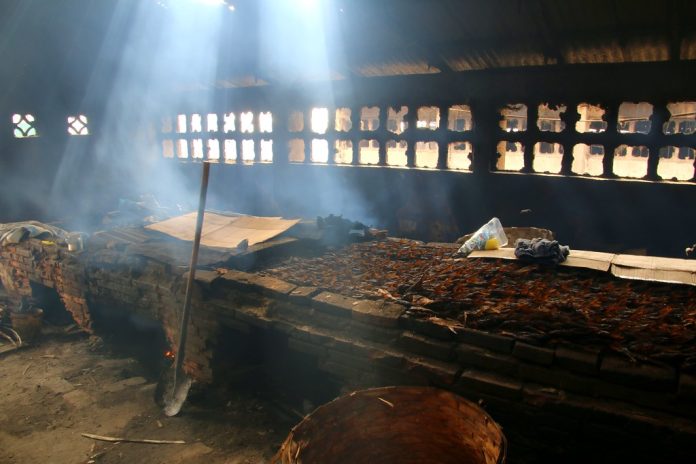By Nelson Manneh
Fish smokers in Tanji and their counterparts within the Greater Banjul Area have called on the Government to introduce the use of solar energy for fish smoking to reduce the consumption of firewood causing deforestation and other health hazards.
In Tanji, most of the people involved in fish smoking are women, who use firewood to preserve fish for both domestic use and for export.
This reporter visited Tanji and other fish smoking sites in the Greater Banjul Area during the weekendand met women busy preserving fish by smoking.
“In other parts of Africa, fish is smoked with the use of solar energy instead of using firewood, and this helps in the preservation of the forests,” Naffie Darboe, a fish smoker inTanji told this reporter.
As the Gambia’s largest fish market, Tanji also has the largest collection of fish smoking sites, and for many years,smoked fish has been sold for use domestically or exported to other parts of the world particularly within the sub-region. The Gambia also has some other landing sites for small-scale fisheries which need to upgrade their smoke houses. Furthermore, there is significant demand for smoke house facilities in some processing plants.
An estimated 30% of the fish caught is traditionally processed and marketed within the country, and part of this amount is then exported to neighbouring West African countries like Senegal, Ghana, Guinea and Nigeria.
Fish smoking has also spread throughout the world and is now a highly common method of preserving fish.
However, the occupational health hazards and injuries associated with fish smoking in the Gambia fishing communities are high, with common perceived injuries such as cuts and lacerations.
Ann Phua, President and Founder of Hemispheres Foundation, said she visited Nigeria and found out that some fish smokers use solar energy to smoke fish, adding that to some extent on a small scale, this new innovation it will help preserve the environment, especially the forest. However, she has seen how women struggleat the smoke sites she visited, particularly Tanji. He said she is sure with this new modernization, it will help them a lot in their work.
Ms Naffie Darboe said they used to send their children to the forest to fetch them firewood in order to smoke their fish, but recently, they find it difficult to get firewood within their forest, forcing them to buy it from individuals, which is very expensive.
“Smoking fish using firewood has caused a lot of environmental hazards for us, and the environment, because we have lost part of the forest due to the firewood we collect,” she said.
Ms Darboe said she recently heard that solar energy can be used for smoking fish, but the new technique requires money and some technical know-how, which is why they are seeking Government’s intervention.
Sirreh Faburay, another fish smoker, said in Banjul they use firewood and other waste materials to smoke fish.
“The use of solar energy has not yet been introduced in the Gambia. Now that we are aware of it, Government should by all means make it a priority because it will not only help to preserve our environment, but it will help decreaseor stop the smoke we inhale during the process,” she said.
Hemispheres Foundation, a nonprofit social organization incorporated in Singapore, is an impact-driven provider of environmental services with over three decades of experience in philanthropic projects around the world.
The foundation offers expertise and tailored services in sourcing, developing, and financing climate and social projects. It works in youth projects, climate reduction and avoidance projects and community based programmes.





















